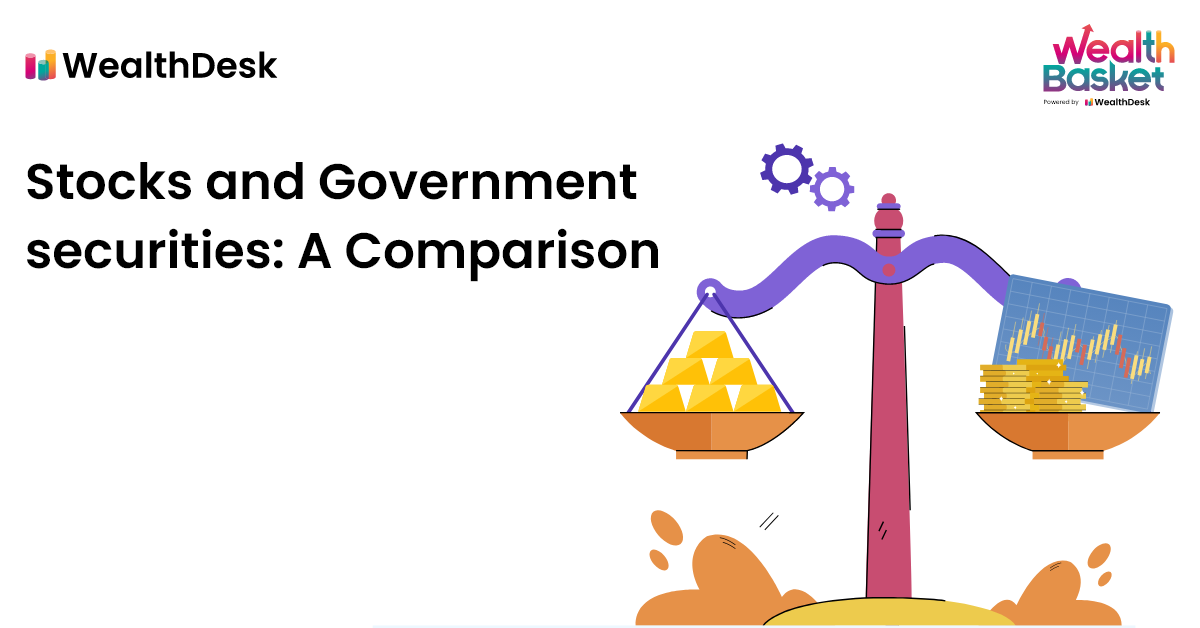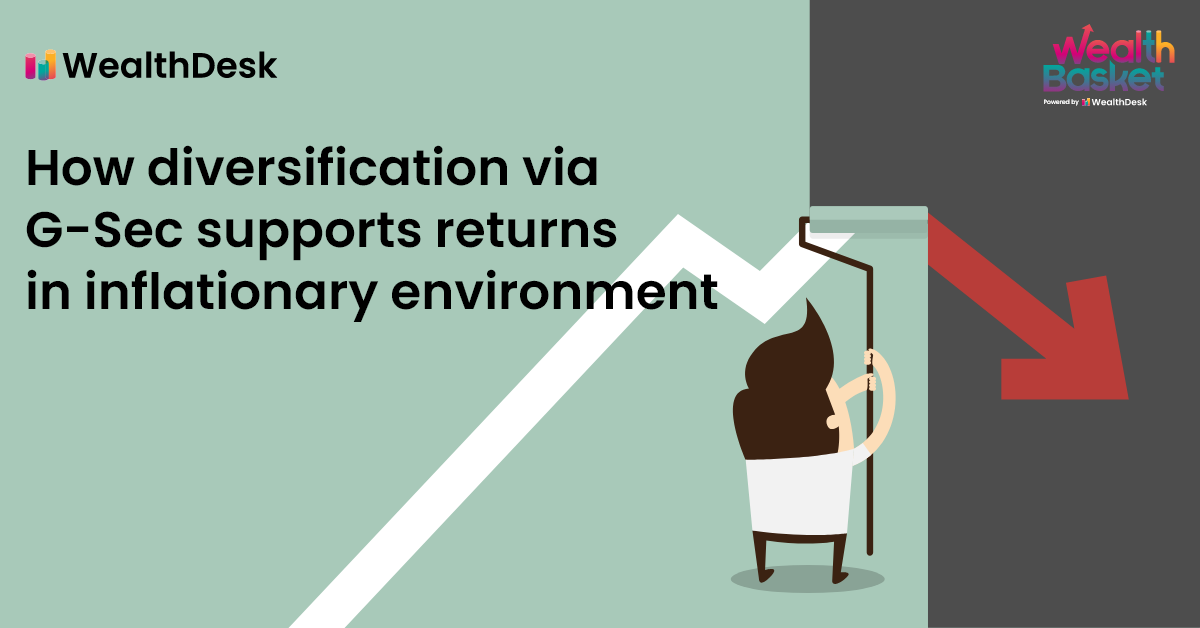After being available only to banks, financial institutions, and corporations; government securities (g-secs) have now become accessible to retail investors. This is after the launch of the Retail Direct Gilt Scheme in 2021.
In this post, we cover the various types of government securities, their pros and cons, and who might want to invest in them.
What are government securities?
To understand what government securities are, let’s first look at bonds. Bonds represent a promise by a borrower to pay a lender their principal and usually the interest (in case there are coupon payments). It can be described as an IOU between the borrower and lender. The issuer of the bond is a borrower or a debtor. Bondholders are the lenders or creditors. The interest payments are referred to as coupon payments.
Bonds can be issued by companies or governments. The bonds issued by the government are called government securities (g-secs). In India, the government has never defaulted on its debt. Therefore, government securities are often called risk-free gilt-edged instruments.
In India, there are various types of government securities that have varying maturity periods.
What are the different types of Government Securities or g-secs?
Treasury Bills (T-bills)
Treasury bills are short term debt instruments that come with tenors of 14, 91, 182 and 364 days. T-bills are issued at discount and are redeemed at par.
Suppose a 14-day treasury bill with a face value of ₹100 is issued at a 10% discount. The issue price would be equal to ₹90 and the investor would receive ₹100 back on maturity. The difference is the return on investment for the specified period.
Dated Government Securities (Dated G-Secs)
Dated Government securities are long term debt instruments that have a tenor ranging from 5 years to 40 years. These government securities usually pay fixed or floating interest payments at regular intervals, which are called coupon payments. These g-secs can be issued by both the Central and the State governments.
In India, 9 types of dated g-secs are issued by the government:
- Floating Rate Bonds
- Fixed-Rate Bonds
- Inflation-Indexed Bonds
- Capital Indexed Bonds
- Sovereign Gold Bonds
- 75% Savings (Taxable) Bonds, 2018
- Bonds with Call/Put Options
- STRIPs (Separate Trading of Registered Interest and Principal of Securities)
- Special Securities
State Development Loans (SDLs)
G-secs that are issued by State Governments are termed State Development Loans. They are issued for the purpose of meeting their budgetary requirements. SDLs pay coupons on a half-yearly basis and pay coupons. They are generally issued for periods up to 10 years.
Sovereign Gold Bonds (SGBs)
Sovereign Gold Bonds are a form of indirect investment in gold. SGBs are issued by RBI on the behalf of the Indian government. Investors get assurance from RBI that they will never lose in terms of the quantity of gold that was allotted to them. However, investors may suffer losses if gold prices decline.
What are the advantages of Government Securities or g-secs?
- Low risk
G-secs are assumed to have no risk of default as there are no records of the Indian government defaulting on domestic bond payments. Due to this reason, g-secs are called risk-free gilt-edged instruments.
- Better yields than fixed deposits and savings accounts
In order to boost the economy during the pandemic, the interest rates have been kept low to encourage borrowing and increase investment. Naturally, the interest rates for savings accounts and fixed accounts have both stayed low. Due to the lower interest rates, the yield on g-secs has risen.
- Fixed-income through coupons
Investors can earn fixed income at regular intervals through coupon payments. The rate of interest payments would be specified as a percentage of the face value of the g-sec. Coupon payments are paid to the investors periodically.
Discover stocks that suit certain filter criteria and dive into details to check their WealthBaskets.
What are the disadvantages of Government Securities or g-secs?
- Low returns
Ideally, an asset would pay you for the risk that you take on when investing in them. This additional return in compensation of the additional risk is called a risk premium. In the case of government securities, this risk premium does not exist as they are assumed to be risk-free. Due to this reason, the returns on government bonds tend to be lower than private bonds that have a certain amount of risk associated with them.
- Interest rate risk
Generally, when interest rates rise, the price of old government bonds will fall as new bonds with higher coupon rates would become the preferred investment option. It is difficult to predict the movements in interest rates, and thus, there is a price risk from interest rate changes. It should be noted that the investors entering the transaction from issue, will not be affected by these changes if they hold the bonds till maturity and collect the principal.
Who should invest in Government Securities or g-secs?
Government securities have maturities longer than fixed deposits, they are a good option for investors looking to earn a stable fixed income. In addition, investors looking to diversify their portfolio to lower the risk exposure of their portfolio may find g-secs useful.
Investors can buy g-secs after the issue date and sell them before maturity on the secondary government securities market, allowing more flexibility, in case the investors wish to liquidate investments.
At WealthDesk, investors can find WealthBaskets which are portfolios made by SEBI-registered professionals. WealthBaskets are available for various investment goals of short term or long term. These portfolios are made up of stocks and ETFs that would be transferred to the subscriber’s Demat account.
FAQs
In India, government securities can be bought by
money market participants, corporations and retail
investors as well. Retail investors can now buy
government securities through a Retail Direct Gilt
(RDG) account.
Non-resident retail
investors who are eligible to invest in Government
Securities under Foreign Exchange Management Act,
1999 can also use the Retail Direct Gilt account to
invest in government securities.
When you buy government securities, you are lending money to the government. Coupon-paying government securities will receive regular interest payments, called coupon payments. In India, the government has never defaulted on their debt, so government securities are considered safe and risk-free.
Due to Statutory Liquid Ratio, a rule set by the RBI, banks are obligated to deposit a specific amount in the central bank in the form of gold, cash or securities. On a day-to-day basis, banks are subject to liquidity constraints. G-secs which have minimal risk, high levels of liquidity and can be readily used as collateral to borrow funds in the money market are lucrative for banks.


















